Artificial Intelligence: The Future of Healthcare in India
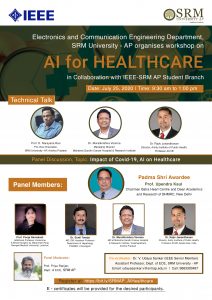 Department of Electronics and Communication Engineering, SRM University-AP, Andhra Pradesh organised an insightful workshop on “Artificial Intelligence (AI) for Healthcare” in collaboration with IEEE-SRM AP Student Branch on 25th July. Prof. D. Narayana Rao, Pro-Vice-Chancellor, inaugurated the session. The workshop was divided into two sessions.
Department of Electronics and Communication Engineering, SRM University-AP, Andhra Pradesh organised an insightful workshop on “Artificial Intelligence (AI) for Healthcare” in collaboration with IEEE-SRM AP Student Branch on 25th July. Prof. D. Narayana Rao, Pro-Vice-Chancellor, inaugurated the session. The workshop was divided into two sessions.
1. Technical presentation
2. Panel discussion
Dr Muralikrishna Voonna, Managing Director, Mahatma Gandhi Cancer Hospital & Research Institute, and Dr Rajiv Janardhanan, Director, Amity Institute of Public Health, Professor ACVB participated in the technical presentation. Dr Voona delivered a lecture on “Impact of AI in Clinical Healthcare” whereas Dr Rajiv Janardhanan spoke on “Sustainable Healthcare: AI-enabled platforms for Affordable and Accessible Healthcare Solutions”.
Eminent panellists such as Padma Shree Awardee Prof. Upendra Kaul, Dr Pooja Ramakant, Dr Sunil Taneja, Dr Muralikrishna Voonna, and Dr Rajiv Janardhanan interacted on “Impact of Covid-19, AI on Healthcare” during the second half of the session. Prof. Priya Ranjan, Department of ECE, SRM-AP, acted as the moderator of the session. Dr Udaya Shankar V, Assistant Professor, Department of ECE, was the coordinator of the workshop.
In his opening remarks, Prof. D. Narayana Rao asserted that healthcare in India faces significant challenges on quality, accessibility and affordability for a large section of the Indian population. Many healthcare experts are aware that in India, 70% of healthcare infrastructures are in the cities which caters only to 30% of India’s Population. “The shortage of doctors, lack of infrastructures, different mindset about the urban and rural population of the country and low government spending on the healthcare are very much motivating India towards innovative and sustainable and affordable technology to improve the quality of life,” said Prof Rao. He further mentioned that AI in Indian healthcare is expanding at a significant rate of 40% approximately. The AI-enabled health services such as automated analysis of medical tests, predictive healthcare diagnosis with the help of monitoring equipment and wearable sensor-based medical devices are expected to revolutionise medical treatment process in the country. AI is being extensively used in six healthcare segments such as hospital administration, pharmaceuticals, diagnostics, medical equipment and supplies, medical insurance and telemedicine. “Moreover, hospitals can implement patient-centric plans with the help of AI to avoid unnecessary hospital procedures and making healthcare services faster in India. The Government of India also shows its keen inclination as in the past week, the Hon’ble prime minister Sri Narendra Modi had a discussion with the CEO of IBM regarding the development of AI-enabled medical instruments for healthcare in the country. Needless to say, there are a plethora of opportunities for new engineers and doctors,” opined Prof Rao.
In his talk, Dr Murali Krishna Voonna confirmed that Artificial intelligence has a huge potential to become a transformational force in healthcare. It allows humans to gain unprecedented insights into diagnosis, care process, treatment variability and patient outcomes. Nowadays, machine learning uses statistical technics to give computing systems to learn with incoming data to identify patterns and make decisions which will help the doctors to assess risks, make a correct diagnosis, and offer more effective treatments. Robot-assisted surgery is now being widely popular for the precision and accuracy in performing a complicated surgery. AI is world’s one of the highest growth industries projected to reach $150 billion by 2026. It can compensate for physician biases and be used in personalised therapy by studying genome. Dr Voonna further informed that there is a huge scope for development in the segments such as brain-computer interface, next-generation radiology tools, creation of precise analytics for pathology images, expanding access to treat underserved regions, clinical decision support etc. to name a few. “Several reputed companies have invested in India to improve the AI in healthcare. NITI Aayog is working with Google to develop artificial intelligence ecosystems in India both in training and research. They have started a National Research Strategy for Artificial Intelligence recently. National Digital Health Authority has been formed as a regulatory body which is going to make the regulation in the Artificial Intelligence in start-ups and business and commercialisation of the products. Still, AI in healthcare is a decision support tool but not a decision-making tool,” explained Dr Voonna.
In the opinion of Dr Rajiv Janardhanan, the healthcare disparity continued because the investments of the government in the years after independence is less than 2 %. COVID-19 has turned out to be a blessing for health care as it made people especially policy-makers to realise that the healthcare infrastructure needs to be improved drastically. The AI-enabled intelligent support system is required because of budget constraints, rising costs of advanced medical treatments, increased complexity and cost of delivering healthcare, as well as increased expectations and demand for quality patient-centred healthcare. India comprises of a healthcare ecosystem where 80% of the healthcare is expensive, and 70% of the population is living in rural areas with marginalised and inaccessible healthcare. This makes the rationale to develop tools which are community empowering. “Knowledge dissemination of health literacy is required necessarily to increase the productive hours of the nation. When we empower the stakeholders with health literacy it directly aligns with the health promotion efforts, provides a rationale with community-empowering policy decision making, where the weakest stakeholder in the healthcare system can be an active participant,” asserted Dr Janardhanan. AI-enabled tagging of data can convert precision medicine to a community-centric new system which is called precision public health. This conversion has to be technology-enabled with support from the engineering fraternity to make it affordable and accessible.
During the second half of the session, the panel discussed the impact of COVID-19 on health immunity system. Padma Shree Awardee Prof Kaul explained in detail how COVID-19 disease affects the human body and the process of vaccination. He gave a detailed overview of how vaccines are prepared and the process of a clinical trial. He further shared the updated information on the COVID-19 vaccine with particular focus on India’s progress in making the vaccine. Dr Taneja and Dr Ramakanth expressed their views on COVID situation based on their daily experience at the hospitals. The panel agreed that the adoption of artificial intelligence (AI) in the healthcare system enables healthcare services, delivered at a lower cost with increased efficiency and emphasis on the diagnostics. AI should be encouraged to be used in machines to predict, comprehend, learn and act. It has the ability to play the role of game-changer in the areas of wellness, early detection, diagnosis, decision making, treatment, end of life, research and training. However, some concerns related to the safety, data quality, accountability, transparency, legal aspects etc. still persists.
The enthralling session ended with the vote of thanks. The insightful event certainly helped the participants to understand the approach in which AI is reinventing and improving modern healthcare through technologies that can estimate, comprehend, explore, and perform effectively.
- Published in ECE NEWS, News, Research News, Research Workshop
Department of Student Affairs organizes “SOP Academics Meeting”
 Department of Student Affairs, SRM University-AP, Andhra Pradesh organizes the SOP Academics Meeting for the students of SRM AP on 28th July, 2020 at 4.45 p.m. During this internal session, the speakers and participants will discuss the protocols that would ensure a beneficial future of the students amidst the pandemic.
Department of Student Affairs, SRM University-AP, Andhra Pradesh organizes the SOP Academics Meeting for the students of SRM AP on 28th July, 2020 at 4.45 p.m. During this internal session, the speakers and participants will discuss the protocols that would ensure a beneficial future of the students amidst the pandemic.
Registration Link: Please Click Here
Department of Student Affairs organises a session on the “Introduction to Mindfulness”
 COVID-19 pandemic, the incessant lockdown and the aftereffects are now hugely affecting people emotionally. Nowadays, many are suffering from fear related to the disease and chronic depression among other ailments. It is high time to apply some scientific methods to keep our minds calm and composed. Department of Student Affairs is organising a session of “Introduction to Mindfulness” on July 30, 2020, at 4 p.m. Dr Salome Divya Joseph is an Assistant Professor at the Department of Psychology. She will be speaking on the importance and methods of the mindfulness during the session.
COVID-19 pandemic, the incessant lockdown and the aftereffects are now hugely affecting people emotionally. Nowadays, many are suffering from fear related to the disease and chronic depression among other ailments. It is high time to apply some scientific methods to keep our minds calm and composed. Department of Student Affairs is organising a session of “Introduction to Mindfulness” on July 30, 2020, at 4 p.m. Dr Salome Divya Joseph is an Assistant Professor at the Department of Psychology. She will be speaking on the importance and methods of the mindfulness during the session.
- Published in Events
Department of Student Affairs organizes “Healthier Way of Online Learning”
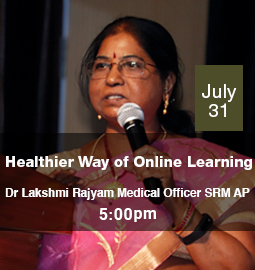 SRM University-AP, Andhra Pradesh will be commencing online classes for the upcoming semester from next week onwards. Considering the apprehension of the students regarding the health issues associated with the online classes, the Department of Student Affairs, SRM AP organizes a webinar where Dr Lakshmi Rajyam, Medical Officer, SRM AP will enable you to understand the healthier approach to online learning. Attend this benefitting webinar on 31st July 2020 at 5 p.m.
SRM University-AP, Andhra Pradesh will be commencing online classes for the upcoming semester from next week onwards. Considering the apprehension of the students regarding the health issues associated with the online classes, the Department of Student Affairs, SRM AP organizes a webinar where Dr Lakshmi Rajyam, Medical Officer, SRM AP will enable you to understand the healthier approach to online learning. Attend this benefitting webinar on 31st July 2020 at 5 p.m.
Registration Link: Please Click Here
IIRS-ISRO 64-Outreach Programme on “Basics of Remote Sensing Geographical Information and Global Navigation Satellite System”
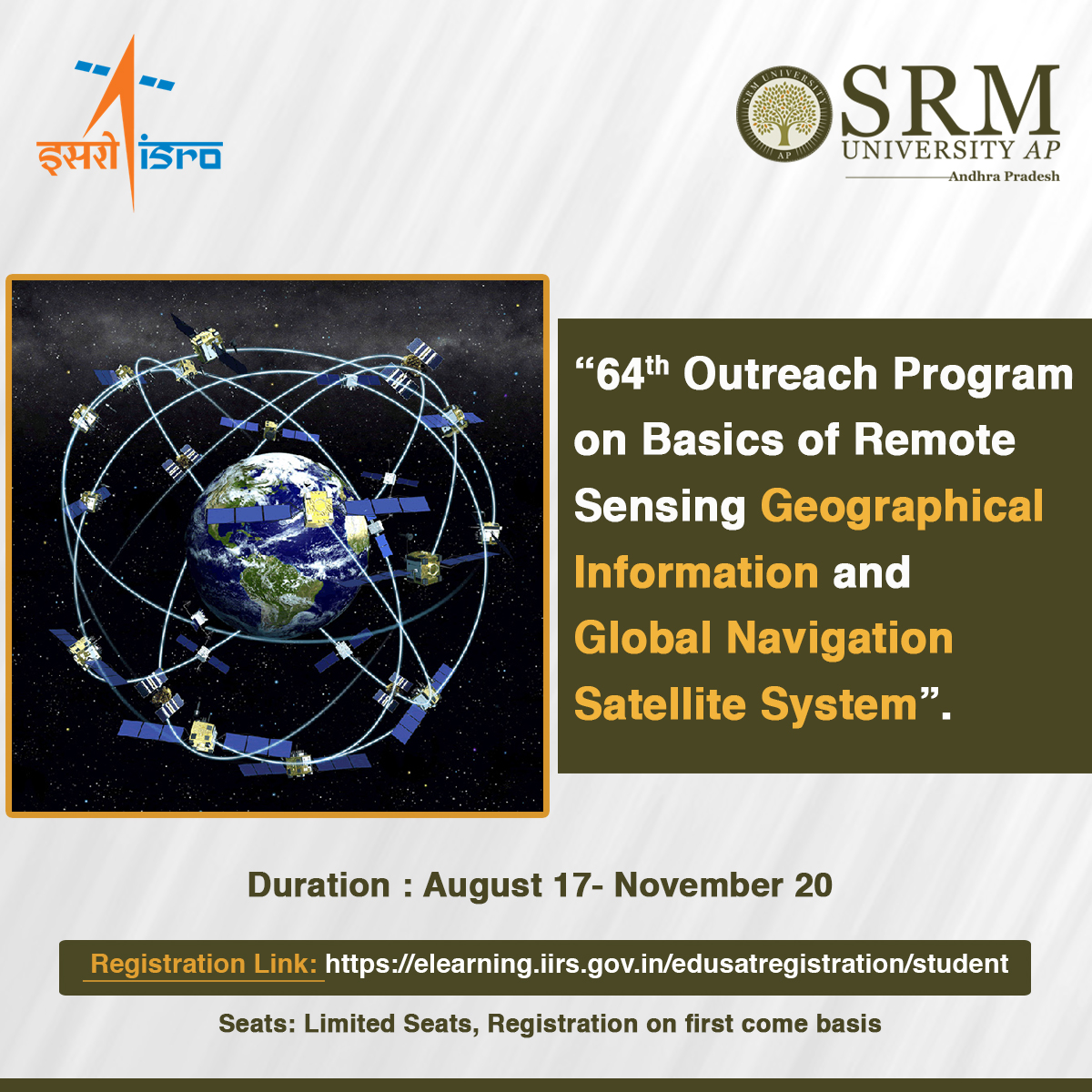 SRM University AP-Andhra Pradesh’s association with the Indian Institute of Remote Sensing (IIRS) -Indian Space Research Organization(ISRO)’s outreach programme will enable our students to attend the 64-Outreach Programme on “Basics of Remote Sensing Geographical Information and Global Navigation Satellite System” to be held from 17th August 2020 till 20th November 2020. SRM AP believes that the excellent opportunity of being associated with ISRO-IIRS initiatives will enable the students to achieve milestones in their careers. The students of SRM AP are advised to swiftly register for the programme as the seats are available on a first come basis.
SRM University AP-Andhra Pradesh’s association with the Indian Institute of Remote Sensing (IIRS) -Indian Space Research Organization(ISRO)’s outreach programme will enable our students to attend the 64-Outreach Programme on “Basics of Remote Sensing Geographical Information and Global Navigation Satellite System” to be held from 17th August 2020 till 20th November 2020. SRM AP believes that the excellent opportunity of being associated with ISRO-IIRS initiatives will enable the students to achieve milestones in their careers. The students of SRM AP are advised to swiftly register for the programme as the seats are available on a first come basis.
Registration Link: Please Click Here
For further details, visit Here
- Published in ECE Events, Events
IIRS-ISRO 65th Outreach programme on “Remote Sensing and Digital Image Analysis”
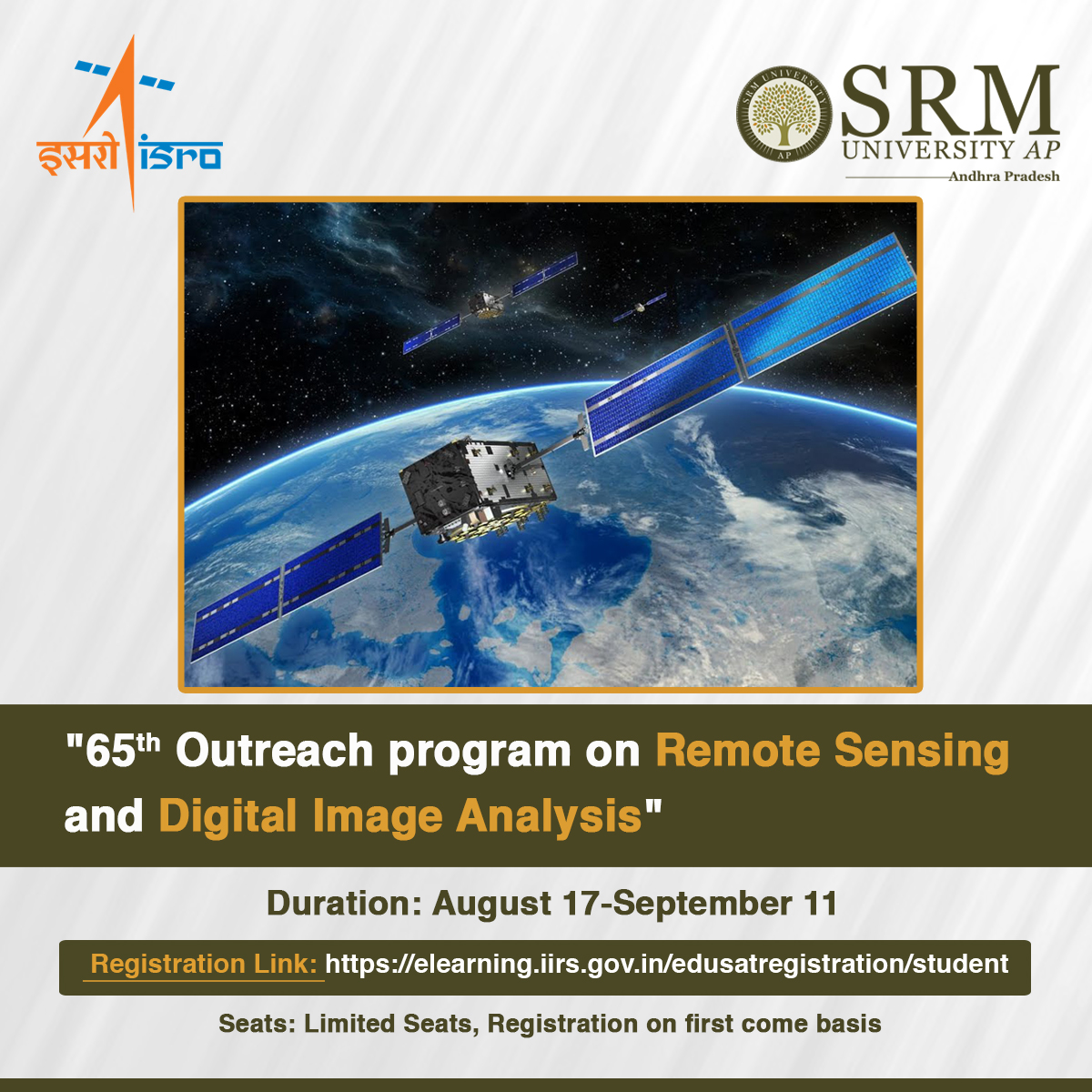 The liaison of SRM University AP-Andhra Pradesh with the Indian Institute of Remote Sensing (IIRS) -Indian Space Research Organization (ISRO) is bringing the exceptional prospect to the students to achieve their career goals in aerospace and geospatial technologies and make a mark globally. The students of SRM AP receives the brilliant opportunity to participate in the 65th Outreach programme on “Remote Sensing and Digital Image Analysis” that is to be conducted from 17th August 2020 till 11th September 2020. As the seats of the programme will be reserved on a first come basis, interested students are urged to apply for the same promptly.
The liaison of SRM University AP-Andhra Pradesh with the Indian Institute of Remote Sensing (IIRS) -Indian Space Research Organization (ISRO) is bringing the exceptional prospect to the students to achieve their career goals in aerospace and geospatial technologies and make a mark globally. The students of SRM AP receives the brilliant opportunity to participate in the 65th Outreach programme on “Remote Sensing and Digital Image Analysis” that is to be conducted from 17th August 2020 till 11th September 2020. As the seats of the programme will be reserved on a first come basis, interested students are urged to apply for the same promptly.
Registration Link: Please Click Here
For further details, visit Here
- Published in ECE Events, Events
The Newsmakers: Interactive session with the top-recruited students
 Another interesting session of The Newsmakers brings an exciting and funfilled conversation with our four champion students who have recently grabbed excellent job offers in the first-ever placement drive of SRM University-AP. Join Pesala Tanmayi, Koushik Bhargav, Tuhin Sarkar, Sri Harsha Tavidisetty Rajendra of CSE Department on August 08, 2020 at 5 pm and learn more about their journey at SRMAP.
Another interesting session of The Newsmakers brings an exciting and funfilled conversation with our four champion students who have recently grabbed excellent job offers in the first-ever placement drive of SRM University-AP. Join Pesala Tanmayi, Koushik Bhargav, Tuhin Sarkar, Sri Harsha Tavidisetty Rajendra of CSE Department on August 08, 2020 at 5 pm and learn more about their journey at SRMAP.
Department of Student Affairs organize “Reinventing Self Through the Science of Positive Psychology”
Department of Student Affairs is organizing a webinar on “Reinventing Self Through the Science of Positive Psychology”. Dr. Smita Sharma, Student Counsellor, SRM AP will be delivering a talk and interacting with the audience during the session to be held on 12th August , 2020 at 5pm.
INCLUSION OF POSITIVE MENTAL HEALTH SKILL BUILDING “WELL-BEING” PROGRAM IN EDUCATIONAL INSTITUTIONS
Student life is one of the most important phases of life. In this phase, students are on a journey to discover themselves personally and professionally as well. To understand and discover the potentialities, there is first a need to understand self – How the mind works and processes information? How to deal with life’s challenges? How to bounce back in times of adversities? How to make use of opportunities… how to empower and enable oneself to move towards a flourishing life? How to deal with failures? How to celebrate success?
Importance of Well-Being in Educational Institutions
Historically educational institutions have aimed for academic excellence as sole evidence for their success. Now, there are growing numbers of educational institutions who are now acknowledging the need to develop students in a more holistic way, with a stronger focus on well-being. Much of this is in recognition of the increasing statistics on psychological distress and mental illness in young adults, and the realization of the need to take a more proactive rather than reactive approach to mental health.
‘Well-Being Program’ based on positive psychology and positive education for educational institutions will act as an antidote to the complex emotions college students are exposed to especially in the present circumstances.
Well-Being: Well-being is an individual’s experience of satisfaction with the ‘past’, contentment with the ‘present ‘and hope for the ‘future ‘. The scientific construct of subjective well-being can be defined as both a cognitive and affective self-evaluation of one’s life and experiences.
Well-Being through the Scientific Study of Positive Psychology
Positive Psychology is a scientific approach to studying human thoughts, feelings and behavior, with a focus on strengths instead of weaknesses, building the good in life instead of repairing the bad, and taking the lives of average people up to “great” instead of focusing solely on moving those who are struggling up to “normal”. As a field, positive psychology spends much of its time thinking about topics like character strengths, optimism, life satisfaction, happiness, well-being, gratitude, compassion (as well as self-compassion), self-esteem and self- confidence, hope and elevation. These topics are studied in order to learn how to help people flourish and live their best lives.
Well-Being and Happiness
Happiness is “people’s evaluations of their lives and encompasses both cognitive judgments of satisfaction and affective appraisals of moods and emotions” (Kesebir & Diener, 2008). It is the experience of joy, contentment, or positive well-being, combined with a sense that one’s life is good, meaningful and worthwhile.
Well-being and Neuroplasticity
The ability of the brain to reorganize itself, both physically and functionally, throughout the life due to an individual’s environment, behavior, thinking, and emotions is called Neuroplasticity. It is important to understand that we have the opportunity to take more responsibility for the intentional shaping of our own minds and through that, we can shape our brains in ways that would enable fundamental constituents of wellbeing to be strengthened.
WELL-BEING PROGRAM
Well-being & Young Adults
Introducing Well-being in colleges aids students in developing positive self-perceptions and adaptive thinking styles, learning to set constructive goals and make healthy future predictions, and building skills to help manage emotions and cope with difficulty. Through this model, the students’ mental health is supported by nurturing their social, emotional and psychological skills, ultimately leading to well-being and happiness of the optimally functioning students.
There can be a long list of benefits of which the most important are:
• Increases engagement.
• Increases Life Satisfaction.
• Increases productivity
• Increases Hope and resilience
• Reduces and prevents symptoms of depression.
• Reduces hopelessness.
• Prevents clinical levels of depression and anxiety.
• Reduces and prevents anxiety.
• May reduce behavioral problems.
• Works equally well for individuals of different racial/ethnic backgrounds
The embedding of positive psychology research findings into education best practices—has also been shown to reduce or even prevent depression and anxiety, increase enjoyment and engagement in colleges, improve curiosity and love of learning, and enhance social skills like empathy, cooperation, assertiveness, and self-control, all of which are correlated with increased academic achievement.
Positive Education and Positive Psychology Skills will assist colleges to develop and maintain the optimal functioning of students and staff by making them efficient to prevent and cure mental illness, improve their productivity and life fulfillment, provide means to nurture their own talent and mainly build hope to deal with any challenges that come their way.
Registration Link: Please Click Here
Independence Day Celebration 2020
Expressing solidarity to contribute to the nation
 SRM University-AP, Andhra Pradesh is celebrating Independence Day 2020 endowed to our nation by our freedom fighters. Prof V. S. Rao, Vice-Chancellor, will initiate the celebration by hoisting the national flag at 9 a.m., followed by an address. He will also present “Care Humanity” award to D. Lenin babu and Yarramsetti Saisrinu who nobly served the needy during the pandemic.
SRM University-AP, Andhra Pradesh is celebrating Independence Day 2020 endowed to our nation by our freedom fighters. Prof V. S. Rao, Vice-Chancellor, will initiate the celebration by hoisting the national flag at 9 a.m., followed by an address. He will also present “Care Humanity” award to D. Lenin babu and Yarramsetti Saisrinu who nobly served the needy during the pandemic.
The day will hurl into various cultural programmes and activities. During the cultural event, there will be dance performances by the students and patriotic songs to accentuate the celebration. Further contributing to the environment of our nation, Prof V. S. Rao along with Dr D. Gunasekaran, Registrar will plant saplings.
Painting competition has also been organized with the theme of “Changing face of India-Independence Day 2020” where the talented students will submit their artwork through online portals. (Interested students of SRM AP are requested to submit their paintings here: Please Click Here). Alongside, music competitions have been arranged where instrumentals and patriotic vocal songs will be the two categories based on which the participants will compete. (Live performers can upload their videos by 14th August, 10 p.m. here: Please Click Here) Even during the distressed situation imposed by the Covid-19, the students, faculty, and staff of SRM AP will come together through the online platform on the occasion of Independence Day to express solidarity in contributing towards the advancement of India.
- Published in Events
National flag hoisting by Prof V S Rao, Vice-Chancellor
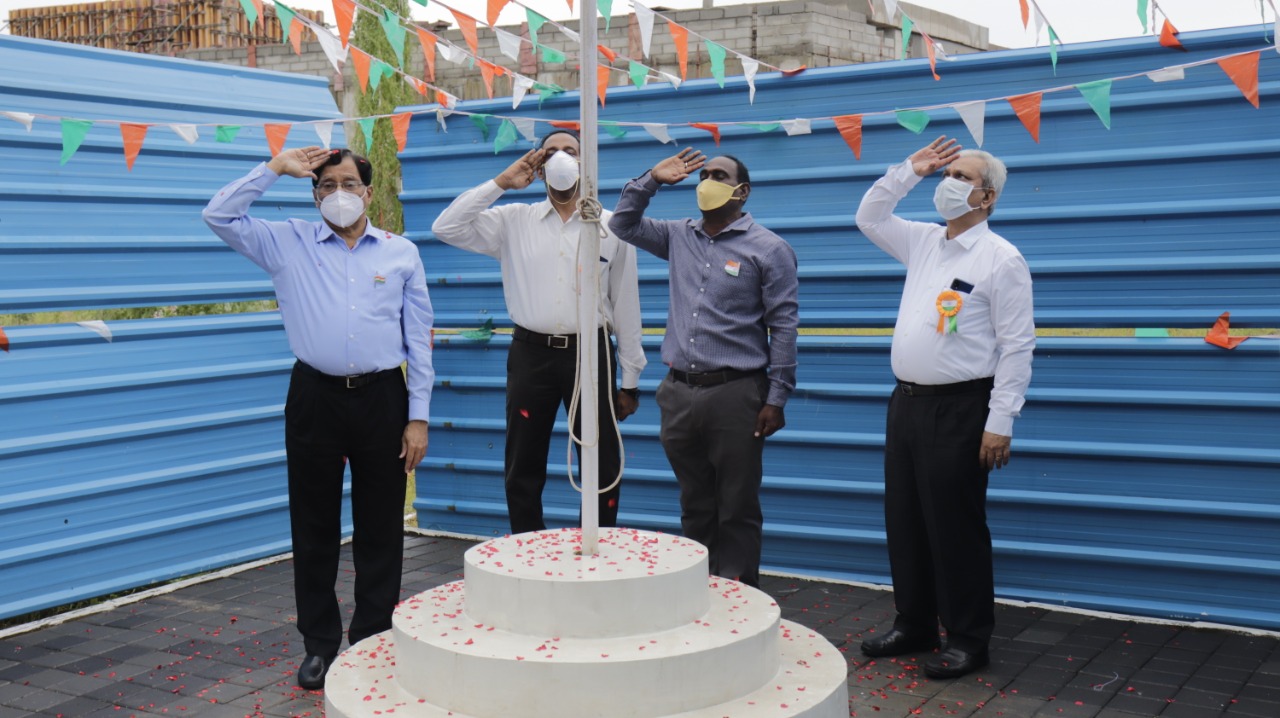 On the occasion of Independence Day, Prof. V. S. Rao, Vice-Chancellor hoisted the national flag and addressed the employees and students. During his address, Prof V. S. Rao remembered our freedom fighters and emphasized on how non-violence freedom struggle set an example for the entire world to imbibe. He further urged everyone to dedicate ourselves to the nation by contributing in advancement of science and technology, especially in the domain of Information Technology, healthcare, nutrition, and agriculture. Dr. D. Gunasekaran, Registrar, Wg Cmdr Venkataachalam Sekkappan, Director-CLM, Ms. Revathi Balakrishnan, Assistant Director-Student Affairs and others participated in the ceremony.
On the occasion of Independence Day, Prof. V. S. Rao, Vice-Chancellor hoisted the national flag and addressed the employees and students. During his address, Prof V. S. Rao remembered our freedom fighters and emphasized on how non-violence freedom struggle set an example for the entire world to imbibe. He further urged everyone to dedicate ourselves to the nation by contributing in advancement of science and technology, especially in the domain of Information Technology, healthcare, nutrition, and agriculture. Dr. D. Gunasekaran, Registrar, Wg Cmdr Venkataachalam Sekkappan, Director-CLM, Ms. Revathi Balakrishnan, Assistant Director-Student Affairs and others participated in the ceremony.
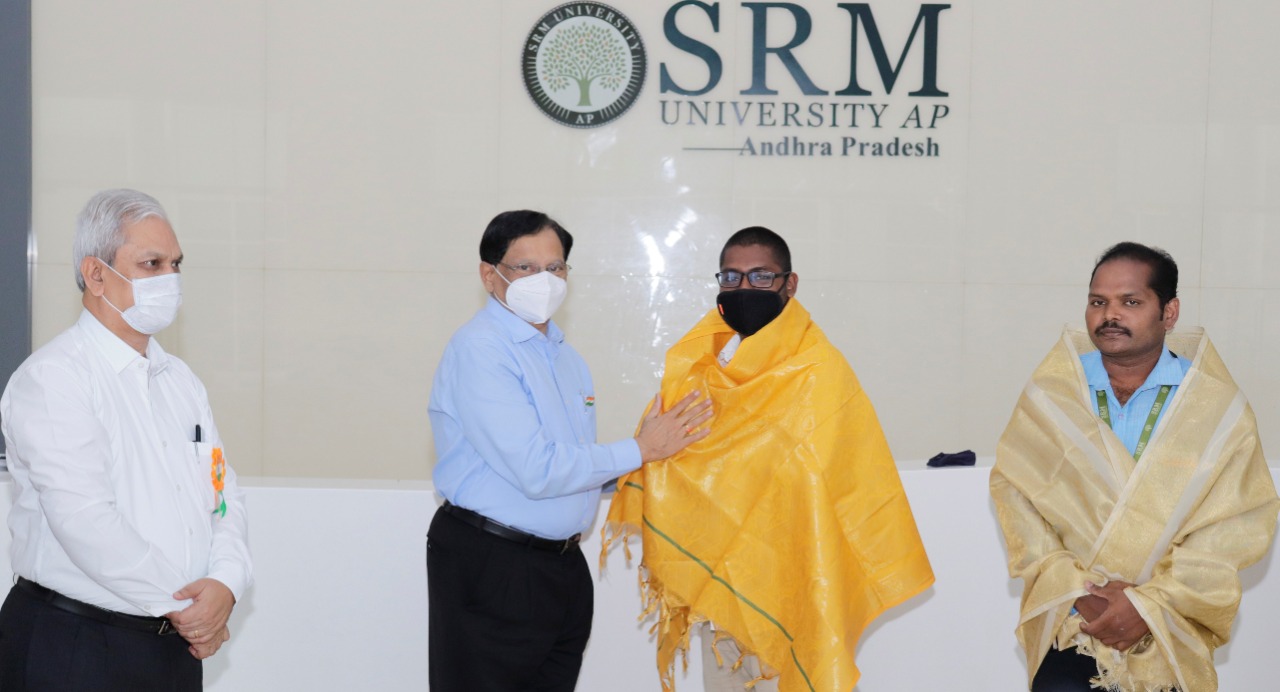 Ph.D. students of SRM AP, D. Lenin babu and Yarramsetti Saisrinu who nobly served the needy during the pandemic were praised by Prof. V. S. Rao and Dr. D. Gunasekaran. During the lockdown, the two students distributed free essentials such as rice and condiments to the poor. They were honored with shawls and were presented the “Care Humanity” award along with mementos. Further, cultural events were organized where students participated in dance and song performances through online platform.
Ph.D. students of SRM AP, D. Lenin babu and Yarramsetti Saisrinu who nobly served the needy during the pandemic were praised by Prof. V. S. Rao and Dr. D. Gunasekaran. During the lockdown, the two students distributed free essentials such as rice and condiments to the poor. They were honored with shawls and were presented the “Care Humanity” award along with mementos. Further, cultural events were organized where students participated in dance and song performances through online platform.

